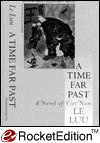

 |

|

The average rating for A Time Far Past based on 2 reviews is 4 stars.
Review # 1 was written on 2018-09-01 00:00:00 John Constantine John ConstantineI loved this novel. I had been complaining of not finding anything from a "North Vietnamese" point of view. Here was the cure. The pace is measured; so sure, precise, and graceful that you don't notice that he is describing village life, the logistics of planting and harvesting, the organization of every day activity as it is moved by the Party, how meals are prepared, what a wedding or a birth ceremony are like, bicycle riding through Ha Noi, and the shape and belongings within a home. It could just as easily be an ethnography or a sociological study. But it is a novel that I waited an extra day to read the last 30 pages just so I could sit with it. There are plenty of love stories, a bit of war -- with the French and the U.S., and the saga of a full life lived within an extended family. I remember with Le Luu's help that in Third World but specifically in village life, there is no such thing as privacy. Hardly a few pages went by before I would re-read passages just for their beauty. Le Luu is psychological astute and above all wise. At vivid play are the tensions between the life of the individual and the dictates of the family, the Party, and the State. Just a masterful presentation that took me took me to a different time and place and allowed me to savor it. |
Review # 2 was written on 2017-05-26 00:00:00 Daniel Bloomer Daniel BloomerDavid Hunt's introduction to "A Time Far Past" calls the novel "a signal event for Americans hoping to make sense of the Vietnam War." Yet the war itself takes up very little space in this relatively long book. Certainly, the protagonist Sai is a hero of the North and his courage and determination are demonstrated in one section of the book. He even heads south to fight but his activities there are curiously left out of the narrative. The focus is instead on the trajectory of his life as the nation travels from rural tradition to a Marxist state in which power is wielded from urban centers (even as the bulk of the population remains in the countryside). There is little direct criticism of the regime; the soldiers of the South are routinely called puppets, the Americans are the enemy, and the issues of promotion, joining the party, even personal relationships are all evaluated in terms of building the nation in language shot through with Marxist sloganeering and pressure to conform. But the novel makes clear on occasion that the new regime is not immune to strategic flattery or even the occasional artful bribe. More important, Sai and Huong, the central lovers, are initially separated because his mandarin family married him off (at ten!). But this is no classical Greek novel in which the lovers are reunited despite adversity. The Marxist orthodoxy of the army conspires to keep Sai from leaving his loveless marriage (here it must be admitted that the result is basically his abandonment of family). But once he does, Huong having married herself, he finds no relief in a second wife of the new urban Vietnam. In a way, Le-Luu seems, without being overtly critical of the state, to be saying that the new ideology, for all its idealism, is not much better at tending to the emotional needs of its people than the one it replaced. |
CAN'T FIND WHAT YOU'RE LOOKING FOR? CLICK HERE!!!